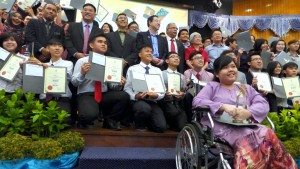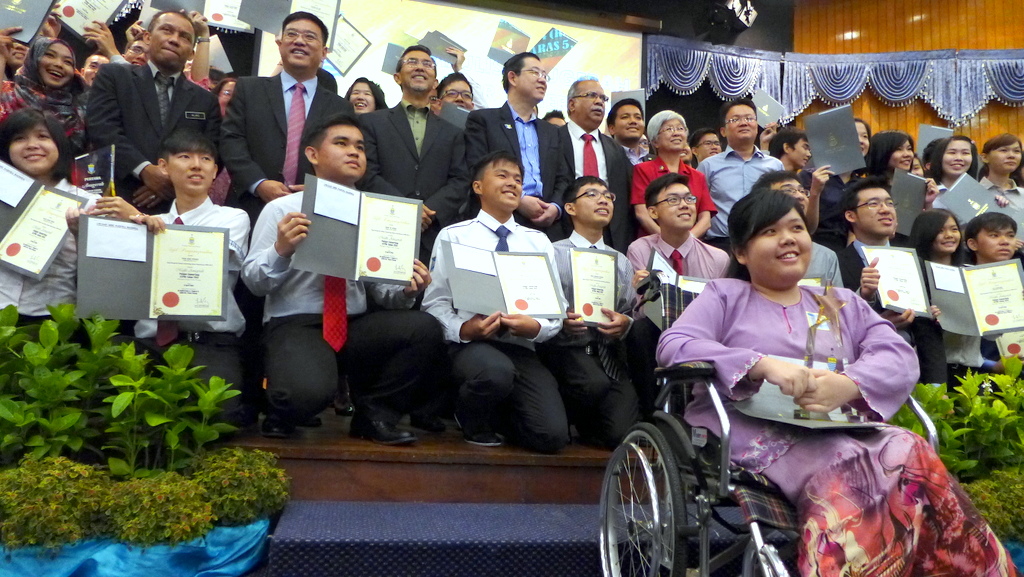Story and pix by Chan Lilian
THE call decentralisation of education to give more power to schools to decide on improving their students’ performance has been made again.
Chief Minister Lim Guan Eng, who is a staunch proponent of the move, repeated his call at an STPM award ceremony and again the next night, at a dinner for Penang industry leaders.
He also issued a press statement on the issue.
On April 9, 63 top STPM students in Penang each received a certificate of recognition and RM600 from the state government.
In the midst of the joy and jubilation of being top students, Lim also reminded them: “We must think of the average students as a whole, so that our country can compete as a developed country. Nowadays, it is no longer the ‘one size fits all’ in schools. Each school, whether in the urban or rural areas, knows best what is best for their students.”
He added that Malaysians should be “alarmed” that their children were doing worse in school compared to children in Thailand and Vietnam, which are poorer than Malaysia.
The Programme for International Students Assessment or PISA 2012 ranked Malaysian students at 52 out 65 as compared to Vietnamese students ranking 17 out of 65.
In his press statement, Lim had stated that “Malaysia’s poor PISA results contradicted BN’s claim that Malaysia has a world class education system on par with the United Kingdom, highlighting instead the weakness of our school system despite education receiving the largest share of national budget annually.
Global management consulting firm McKinsey has suggested what schools need to do after studying 25 of the world’s school systems, including the top performers in PISA tables.
As reported in The Edge, schools need to do three things:
• get the best teachers;
• get the best out of teachers; and
• step in when pupils start to lag behind.
This is where the Education Ministry needs to invest in if Malaysia wants to meet its objective of being in the top third in the PISA ranking.
Based on the total amount spent on education per student in the six to 15 years age range, over a 10-year period (eduex) that amount is above the per capita GDP.
Almost all of the performers in the top third spend more than 100% in eduex above their pc GDP.
The OECD average is 147%.
Malaysia on the other hand is at the bottom of the PISA spectrum and spends the least amount compared with all the countries listed in the chart – a mere 12% on eduex above pcGDP.
Even Thailand with a lower pcGDP than us, spends 43%.
”It is ironic that Malaysia’s education budget allocates a huge amount for education, but lags behind,” Lim said, adding it is time we give some attention to students in the 6 to 15 years range.

“Malaysia must be bold on decentralisation to give more power to schools to make their own decisions based on their local circumstances. There is no one size-fits-all education system. After all, you cannot teach a fish how to climb trees. Further, schools can be more efficient by grading them on performance and merit which will compel them to seek better trained teachers. Ultimately it is the school teachers that makes the difference and can inspire students towards excellence.”
He reminded the top students and their parents: “Education is our lifeboat to the future. Not only can it reduce inequality, it can provide mobility and opportunity to all. Only a sound education foundation can provide ladders of opportunity and escalators to mobility.”
The state government is adopting a three-pronged approach towards strengthening our education system:
– Giving annual funding to existing half-funded vernacular and religious schools;
– Building learning centres that focus on STEM – teaching of science, technology, English and Mathematics; and
– Attracting world class universities as well as adopting the German vocational school system within multi-national corporations.
“These are huge challenges and success is yet uncertain. But we must be willing to try and invest in education. For only when we boldly invest in the future can we win the future,” Lim said.
The Chief Minister ended his speech to the STPM students who are embarking on their further studies with this call: “This is only the beginning. Make sure when you have completed your education, you come back and make Penang your home. I am sure your parents will be very happy too.”

